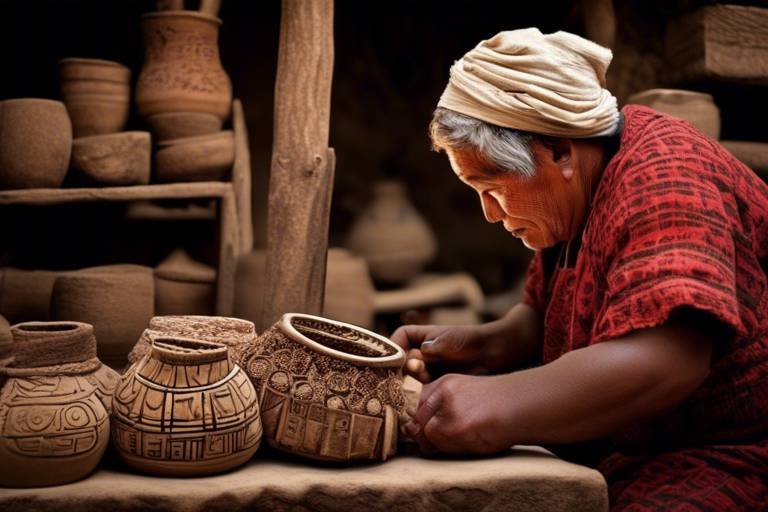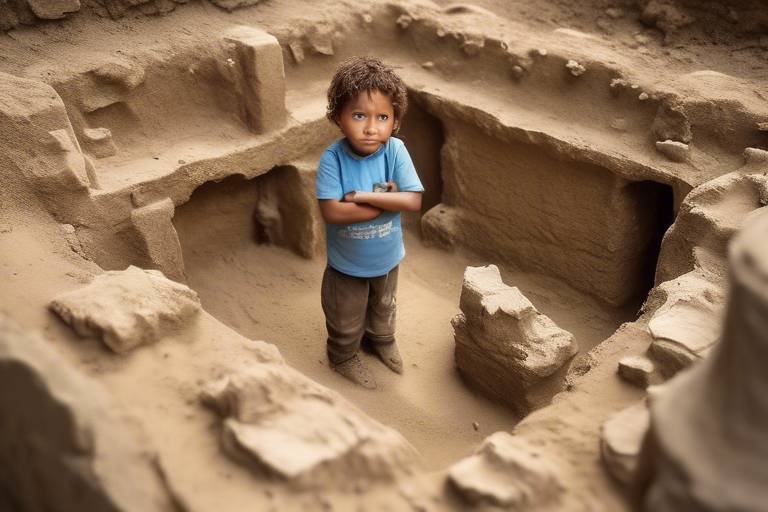How History Shapes Contemporary Society
History serves as a powerful force that intricately weaves the fabric of contemporary society, leaving an indelible mark on culture, politics, and social norms. The echoes of past events, movements, and decisions resonate through time, shaping the world we inhabit today. It is fascinating to delve into the profound impact of historical narratives on the intricate tapestry of modern societies.

Legacy of Colonialism
Exploring the profound impact of historical events, movements, and decisions on modern societies, influencing culture, politics, and social norms in various ways.
Colonialism has left a lasting imprint on contemporary societies worldwide, shaping power dynamics, economic structures, and cultural identities. The legacy of colonial rule continues to influence the relationships between former colonizers and colonized nations, as well as the disparities in wealth and resources that persist to this day.
Furthermore, the process of cultural assimilation during colonial times has led to the blending of traditions, languages, and customs, creating complex hybrid identities in many post-colonial societies. The impact of colonialism on indigenous populations and their struggles for recognition and rights remains a significant issue in the modern world.

Impact of World Wars
World Wars I and II have left an indelible mark on the course of history, shaping the geopolitical landscape and global dynamics in profound ways. The impact of these catastrophic conflicts reverberates through time, influencing not only the political alliances and security strategies of nations but also the very fabric of contemporary society.
The aftermath of World War I saw the redrawing of national borders, the collapse of empires, and the birth of new ideologies. The Treaty of Versailles, signed in 1919, imposed harsh penalties on Germany, setting the stage for the rise of totalitarian regimes and ultimately leading to the outbreak of World War II. The scars of these conflicts continue to shape the power dynamics and diplomatic relations among nations today.
Furthermore, the technological advancements spurred by the necessity of war have had a lasting impact on modern society. Innovations in communication, transportation, and weaponry during the World Wars laid the groundwork for the rapid advancements in technology that define the contemporary era. From the development of radar and nuclear energy to the evolution of aviation and computing, the legacy of wartime innovation permeates every aspect of our daily lives.
The alliances forged during the World Wars continue to influence global politics and security strategies in the present day. The formation of organizations like the United Nations and NATO, born out of the need to prevent future conflicts and promote international cooperation, exemplifies the enduring legacy of these conflicts. The lessons learned from the devastation of the World Wars have shaped the approach to diplomacy, conflict resolution, and peacekeeping efforts around the world.
Moreover, the social and cultural repercussions of the World Wars are evident in the collective memory and identity of societies impacted by these conflicts. The trauma experienced by individuals and communities during wartime has shaped attitudes towards peace, conflict resolution, and human rights. The stories of resilience, sacrifice, and survival from the World Wars serve as reminders of the human capacity for both destruction and renewal.
In conclusion, the impact of World Wars I and II on contemporary society is multifaceted and far-reaching. From the geopolitical realignments and security strategies to the technological advancements and cultural legacies, these conflicts have fundamentally shaped the world we inhabit today. Understanding and acknowledging the consequences of these wars are essential in navigating the complexities of the modern world and working towards a more peaceful and prosperous future.

Civil Rights Movements
Exploring the profound impact of historical events, movements, and decisions on modern societies, influencing culture, politics, and social norms in various ways.
Examining the enduring effects of colonial rule on contemporary societies, including power dynamics, economic disparities, and cultural assimilation.
Analyzing how the aftermath of World Wars I and II continues to shape global politics, alliances, and security strategies in the present day.
The Civil Rights Movements of the past have been instrumental in shaping the landscape of contemporary activism, legislation, and societal attitudes towards equality and justice. These movements, characterized by passionate advocacy for civil liberties and equal rights for marginalized groups, have left a lasting impact on the fabric of society.
Exploring how historical advancements in technology have revolutionized communication, transportation, and daily life, shaping modern society's infrastructure and lifestyle.
Examining the lasting impact of revolutionary ideologies such as Marxism, feminism, and nationalism on contemporary political discourse, social movements, and governance.
Addressing the long-term effects of historical traumas like genocide, slavery, and war on collective memory, mental health, and efforts towards reconciliation and healing.
Exploring how past human interactions with the environment have influenced contemporary environmental policies, conservation efforts, and debates on sustainability.
Reflecting on the importance of learning from historical mistakes, successes, and innovations to navigate current societal challenges and envision a better future.

Technological Advancements
Exploring the profound impact of historical events, movements, and decisions on modern societies, influencing culture, politics, and social norms in various ways.
Technological advancements have played a pivotal role in shaping the fabric of contemporary society. From the invention of the wheel to the digital revolution, each technological leap has transformed how we live, work, and interact with the world around us. The Industrial Revolution, for example, ushered in an era of mass production and urbanization, laying the foundation for modern industrial societies.
Moreover, the advent of the internet and mobile technology has revolutionized communication, breaking down geographical barriers and connecting people across the globe in an instant. Social media platforms have redefined social interactions, enabling individuals to share ideas, mobilize movements, and influence public discourse on a global scale.
Transportation has also undergone significant advancements, from steam engines to high-speed trains and electric vehicles. These innovations have not only made travel more efficient and accessible but have also shaped urban planning and environmental sustainability efforts.
Furthermore, technological breakthroughs in fields such as medicine, agriculture, and artificial intelligence have improved healthcare outcomes, boosted food production, and transformed industries, driving economic growth and innovation. The integration of automation and robotics in manufacturing processes has increased efficiency and productivity, albeit raising questions about job displacement and workforce adaptation.
In essence, technological advancements continue to shape contemporary society, offering both opportunities and challenges as we navigate an increasingly interconnected and digitized world.
- Why is it important to study history?
- How do historical events influence modern society?
- What can we learn from past technological advancements?
Studying history provides valuable insights into the origins of societal structures, cultural norms, and political systems, helping us understand the present and make informed decisions for the future.
Historical events shape modern society by influencing laws, social norms, and cultural practices that have been passed down through generations, impacting how we perceive the world and interact with one another.
We can learn from past technological advancements by understanding the impact of innovation on society, identifying patterns of change, and anticipating the potential consequences of future technological developments.

Revolutionary Ideologies
Revolutionary ideologies have played a pivotal role in shaping the political landscape and societal norms of contemporary society. From Marxism to feminism to nationalism, these ideologies have sparked movements, influenced governance, and driven social change. Marxism, with its focus on class struggle and economic equality, continues to inspire debates on capitalism and socialism. Feminism, advocating for gender equality and women's rights, has reshaped policies and challenged traditional gender roles. Nationalism, promoting loyalty to one's nation, has both united and divided societies, influencing political decisions and international relations.

Historical Trauma and Healing
Exploring the profound impact of historical events, movements, and decisions on modern societies, influencing culture, politics, and social norms in various ways.
Historical trauma refers to the deep emotional wounds and lasting psychological scars inflicted by past atrocities such as genocide, slavery, and war. These traumatic experiences not only shape individual and collective memory but also influence societal structures and relationships.
Healing from historical trauma is a complex and ongoing process that requires acknowledgment, understanding, and reconciliation. It involves confronting the painful truths of the past, honoring the memories of those who suffered, and working towards healing the intergenerational effects of trauma.
One way societies address historical trauma is through commemoration and remembrance. Memorials, museums, and educational programs serve as important tools for preserving the memory of past injustices and fostering empathy and understanding among future generations.
Moreover, initiatives focused on truth and reconciliation play a vital role in promoting healing and fostering unity in divided societies. By acknowledging past wrongs, seeking justice for victims, and promoting dialogue and understanding, communities can begin to heal the wounds of history.
It is essential for societies to recognize the long-term effects of historical trauma and actively engage in processes of healing and reconciliation. By confronting the legacies of the past with honesty and compassion, societies can build a more inclusive, empathetic, and resilient future.

Environmental History
When delving into the realm of , we uncover a tapestry woven with the threads of human interaction with the natural world. Throughout centuries, our relationship with the environment has shaped not only our surroundings but also our societal structures and cultural practices. From ancient civilizations' agricultural innovations to the industrial revolution's impact on ecosystems, the history of human-environment interactions is a narrative of adaptation, exploitation, and conservation.
One pivotal aspect of environmental history is the recognition of how past societies utilized and altered their surroundings. The rise and fall of civilizations have been closely linked to their ability to harness natural resources sustainably. For instance, the collapse of the Mayan civilization serves as a cautionary tale of environmental mismanagement, highlighting the importance of ecological balance in societal longevity.
Furthermore, the industrial revolution marked a significant turning point in environmental history, ushering in an era of unprecedented resource extraction and pollution. The rapid advancements in technology and production processes led to widespread environmental degradation, sparking movements for conservation and sustainability.
Exploring the evolution of environmental policies and conservation efforts provides insights into contemporary debates on climate change, biodiversity loss, and sustainable development. Historical precedents, such as the establishment of national parks and wildlife reserves, offer valuable lessons for addressing current environmental challenges and fostering a harmonious relationship between humanity and nature.
By studying environmental history, we gain a deeper understanding of the interconnectedness between human societies and the natural world. The past serves as a guide for shaping present-day environmental practices and policies, emphasizing the importance of responsible stewardship and proactive measures to preserve the planet for future generations.

Lessons from the Past
Exploring the profound impact of historical events, movements, and decisions on modern societies, influencing culture, politics, and social norms in various ways.
History serves as a powerful teacher, offering invaluable lessons that can guide present and future generations towards a more enlightened path. By delving into the annals of the past, we uncover a treasure trove of wisdom waiting to be unearthed.
Through the lens of history, we witness the consequences of human actions, both noble and nefarious. It provides a mirror reflecting the triumphs and failures of our predecessors, illuminating the pathways they paved and the pitfalls they encountered.
Moreover, history offers a tapestry of narratives showcasing resilience, innovation, and the enduring spirit of humanity in the face of adversity. It reminds us of the transformative power of perseverance and the capacity for individuals and societies to evolve and adapt.
By studying historical blunders and breakthroughs, we gain insights into the complexities of human nature, the dynamics of power, and the fragility of progress. History compels us to question, analyze, and challenge prevailing assumptions, fostering critical thinking and informed decision-making.
Furthermore, the echoes of the past reverberate in contemporary dilemmas and dilemmas, urging us to heed the warnings and embrace the triumphs of our predecessors. Drawing from the reservoir of historical knowledge, we equip ourselves with the tools necessary to navigate the turbulent waters of the present and steer towards a more equitable and sustainable future.
Frequently Asked Questions
- What is the significance of studying history in understanding contemporary society?
Studying history is crucial for comprehending the present as it provides insights into the origins of societal structures, cultural norms, and political systems. By examining historical events and decisions, we can better grasp the complexities of contemporary issues and trends.
- How does colonialism continue to impact modern societies?
Colonialism has left a lasting legacy on contemporary societies through power imbalances, economic inequalities, and cultural influences. The effects of colonial rule can be seen in political structures, social hierarchies, and global economic disparities that persist to this day.
- What role do technological advancements play in shaping modern society?
Technological advancements have revolutionized various aspects of modern life, from communication and transportation to healthcare and entertainment. The rapid pace of technological innovation continues to reshape how we interact, work, and navigate the world around us.
- Why is it important to learn from past mistakes and successes?
Learning from history allows us to avoid repeating past mistakes, build upon previous successes, and envision a more informed future. By reflecting on historical lessons, we can navigate current challenges with greater wisdom and foresight.



















